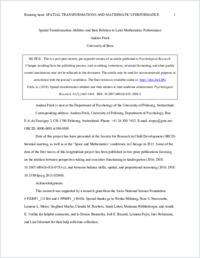Spatial transformation abilities and their relation to later mathematics performance
- Frick, Andrea University of Fribourg
-
10.04.2018
Published in:
- Psychological Research. - 2019, vol. 83, no. 7, p. 1465-1484
English
Using a longitudinal approach, this study investigated the relational structure of different spatial transformation skills at kindergarten age, and how these spatial skills relate to children’s later mathematics performance. Children were tested at three time points, in kindergarten, first grade, and second grade (N = 119). Exploratory factor analyses revealed two subcomponents of spatial transformation skills: one representing egocentric transformations (mental rotation and spatial scaling), and one representing allocentric transformations (e.g., cross-sectioning, perspective taking). Structural equation modeling suggested that egocentric transformation skills showed their strongest relation to the part of the mathematics test tapping arithmetic operations, whereas allocentric transformations were strongly related to numeric-logical and spatial functions as well as geometry. The present findings point to a tight connection between early mental transformation skills, particularly the ones requiring a high level of spatial flexibility and a strong sense for spatial magnitudes, and children’s mathematics performance at the beginning of their school career.
- Faculty
- Faculté des lettres et des sciences humaines
- Department
- Département de Psychologie
- Language
-
- English
- Classification
- Psychology
- License
-
License undefined
- Identifiers
-
- RERO DOC 324090
- DOI 10.1007/s00426-018-1008-5
- Persistent URL
- https://folia.unifr.ch/unifr/documents/307466
Statistics
Document views: 195
File downloads:
- Texte intégral: 779
